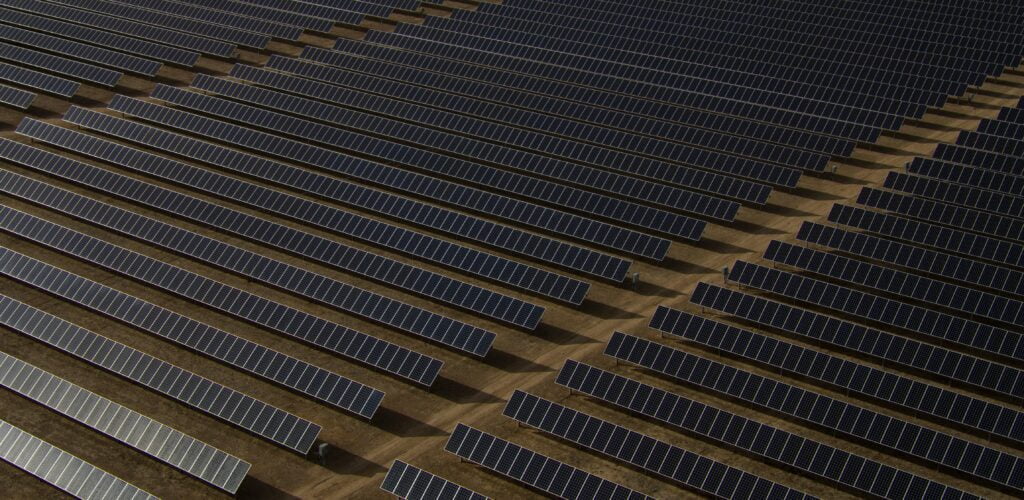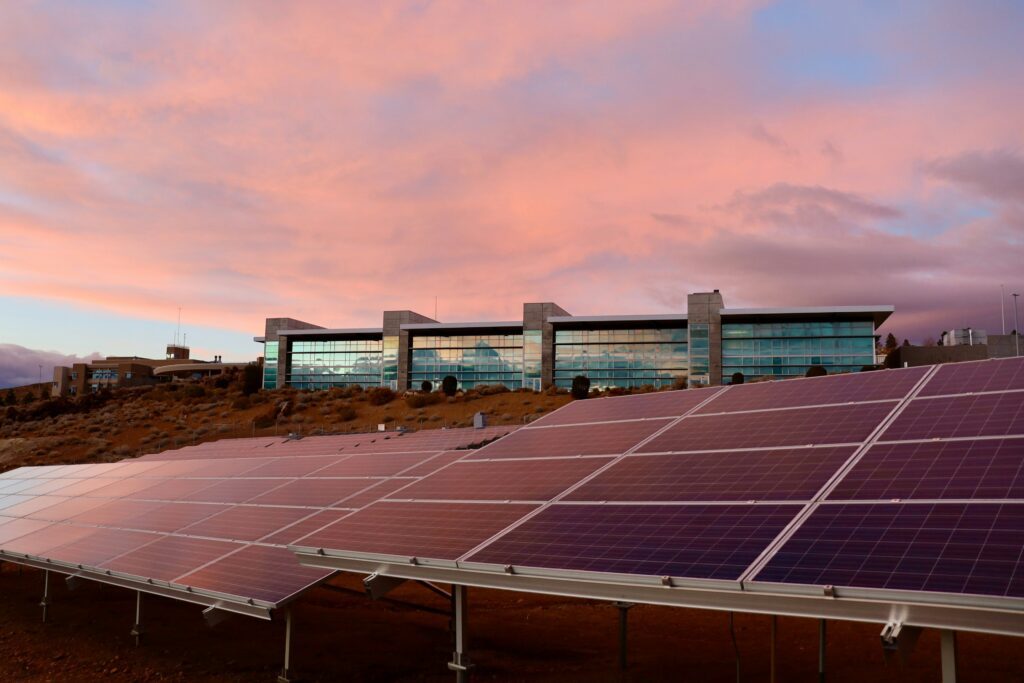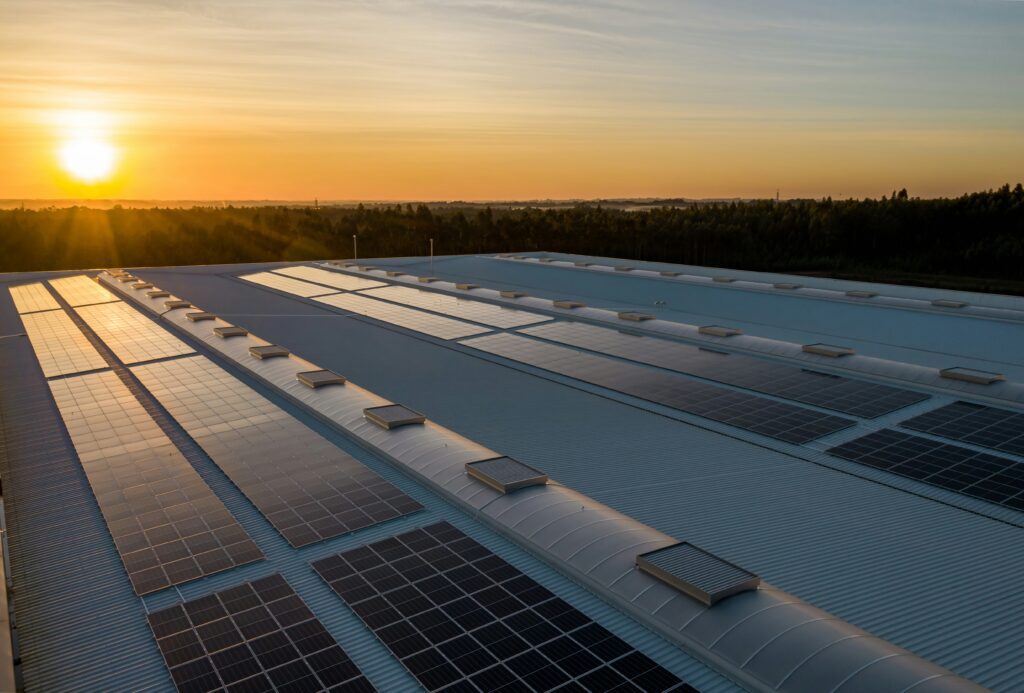Different Between On Grid and Off Grid Solar Panels. Which Solar Panel to buy?
Solar power systems are becoming more popular as people look for cleaner and cheaper energy sources. Solar energy helps reduce electricity bills and is good for the environment. Many homes and businesses are now choosing to use solar power.
There are two main types of solar panel systems: on-grid and off-grid. This article will help you understand the differences between these systems and help you decide which one is best for your needs.

What is an On-Grid Solar Power System?
Definition and Basic Concept
An on-grid solar power system is connected to the public electricity grid. This means it works with the grid to provide electricity to your home or business. When the sun is shining, your solar panels make electricity. If you make more electricity than you need, the extra goes back to the grid. When the sun is not shining, you can use electricity from the grid.
Components of On-Grid Systems
Solar Panels:
These panels catch sunlight and turn it into electricity.
Inverters:
They change the direct current (DC) electricity from the solar panels into alternating current (AC) electricity, which is used by most home appliances.
Grid Connection:
This is the link between your solar power system and the public electricity grid. It lets you send extra electricity back to the grid and take power from it when needed.
How On-Grid Systems Work
An on-grid system works by using solar panels to capture sunlight and convert it into electricity. This electricity goes to an inverter, which changes it from DC (direct current) to AC (alternating current), so it can be used in your home.

If your solar panels make more electricity than you need, the extra power goes back to the grid. If you need more electricity than your panels make, you can use power from the grid.
Advantages of On-Grid Systems
Cost-Effectiveness:
On-grid systems can save you money on your electricity bills. You can also get credits for the extra electricity you send back to the grid, a process called net metering.
Reliability and Backup from the Grid:
Since you are connected to the grid, you always have a reliable source of electricity, even when your solar panels are not producing power.
Net Metering Benefits:
Net metering allows you to earn credits for the extra electricity your solar panels produce. These credits can help reduce your future electricity bills.
Disadvantages of On-Grid Systems
Dependence on the Grid:
On-grid systems rely on the public electricity grid. If there is a power outage, your solar system will also stop working. This is because the system is designed to shut down for safety reasons when the grid is down.
No Power During Grid Outages:
Even if your solar panels are producing electricity, you won’t have power during a grid outage unless you have a backup battery system. This can be a problem in areas with frequent power outages.
What is an Off-Grid Solar Power System?
Definition and Basic Concept
An off-grid solar power system is not connected to the public electricity grid. This means it works on its own to provide electricity to your home or business. When the sun is shining, your solar panels make electricity, which is stored in batteries for use at any time. You do not rely on the grid for power.
Components of Off-Grid Systems
Solar Panels:
These panels catch sunlight and turn it into electricity.
Battery Storage:
Batteries store the electricity made by the solar panels so you can use it when the sun is not shining.
Inverters:
They change the direct current (DC) electricity from the solar panels and batteries into alternating current (AC) electricity, which is used by most home appliances.
Backup Generator (Optional):
A generator can give extra power during times of low sunlight or high electricity use.
How Off-Grid Systems Work
An off-grid system works by using solar panels to catch sunlight and turn it into electricity. This electricity is stored in batteries. The inverter changes the electricity from DC (direct current) to AC (alternating current) so it can be used in your home. When the sun is not shining, you use the stored electricity from the batteries. If you need extra power, a backup generator can help.
Advantages of Off-Grid Systems
Independence from the Grid:
You do not rely on the public electricity grid, so you have power even during grid outages.
Power Availability in Remote Areas:
Off-grid systems are great for remote areas where it is hard to connect to the public electricity grid.
No Electricity Bills:
Since you are not using the public grid, you do not get electricity bills. This can save you money over time.
Disadvantages of Off-Grid Systems
Higher Initial Costs:
Off-grid systems usually require more equipment, like batteries and sometimes a backup generator, which can be expensive to install compared to on-grid systems.
Battery Maintenance and Replacement:
Batteries in off-grid systems need regular maintenance and eventually replacement, which adds to the overall cost and maintenance effort.
Limited Power Supply Depending on Battery Capacity:
The amount of electricity you can use depends on how much energy your batteries can store. If you use more power than your batteries can store, you may run out of electricity until the sun shines again.
Difference Between these 2 Types of Solar Panels:
Grid Dependence
On-Grid Systems:
Depends on the public electricity grid for power supply and does not work during grid outages.
Off-Grid Systems:
Work independently of the grid, providing power even when the grid is down.
Cost and Financial Incentives
On-Grid Systems:
Generally have lower initial costs due to fewer components needed. They can also benefit from net metering, which credits you for excess electricity sent to the grid.
Off-Grid Systems:
Require higher initial investment due to the need for batteries and potential backup generators. However, they eliminate electricity bills over time.
Energy Storage and Backup
On-Grid Systems:
Do not store energy for later use and rely on the grid for backup during power outages.
Off-Grid Systems:
Include battery storage to store excess energy for use when the sun is not shining, providing reliable power independent of the grid.
Suitability and Applications
On-Grid Systems:
Ideal for urban areas where grid connection is reliable and cost-effective solutions are preferred.
Off-Grid Systems:
Suitable for remote areas without access to the grid or where the grid connection is expensive, offering self-sufficiency and independence.
Choosing the Right Types of Solar Panel Systems for Your Needs:
When deciding between an on-grid or off-grid solar power system, consider the following factors:
Assessing Energy Needs and Usage Patterns
On-Grid Systems:
Calculate your average electricity consumption and consider if you can benefit from net metering. This helps determine if an on-grid system can meet your needs efficiently.
Off-Grid Systems:
Assess your energy needs and storage requirements carefully. Determine how much electricity you use daily and how much storage capacity you need in batteries to ensure an uninterrupted power supply.
Location and Accessibility to the Grid
On-Grid Systems:
Consider the reliability and availability of the grid connection in your area. Urban areas typically have better grid reliability compared to rural or remote locations.
Off-Grid Systems:
Evaluate if grid connection is feasible and cost-effective. Off-grid systems are suitable for areas where grid connection is unavailable or prohibitively expensive.
Budget and Financial Considerations
On-Grid Systems:
Lower initial costs and potential savings through net metering can make on-grid systems more financially attractive in the short term.
Off-Grid Systems:
- Higher upfront costs due to batteries and potentially a backup generator should be weighed against long-term savings on electricity bills and independence from utility costs.
Long-Term Goals and Sustainability
On-Grid Systems:
Consider your environmental impact and long-term sustainability goals. On-grid systems contribute to reducing carbon footprint but are dependent on grid infrastructure.
Off-Grid Systems:
Offer energy independence and sustainability benefits, especially in remote areas or for individuals prioritizing self-sufficiency and resilience.
By evaluating these factors, you can make an informed decision on whether an on-grid or off-grid solar power system is best suited to meet your energy needs and goals.
Conclusion
Understanding the differences between on-grid and off-grid solar power systems is crucial when choosing the right option for your home or business.
Summary of Key Points:
On-grid systems are connected to the public electricity grid, offering cost-effectiveness and reliability but dependent on grid availability. Off-grid systems operate independently, providing autonomy and resilience, albeit with higher initial costs and maintenance requirements.

Importance of Making an Informed Decision:
Assessing your energy needs, considering location factors, and evaluating financial implications will help you select the system that best aligns with your goals and circumstances.
Encouragement to Explore Solar Options:
Whether aiming to reduce electricity bills, achieve energy independence, or contribute to environmental sustainability, solar power systems offer versatile solutions tailored to diverse needs.
Frequently Asked Questions (FAQ) About Solar Power Systems
1. What are the main benefits of using solar power?
Solar power systems offer several benefits, including:
Cost Savings:
By generating your own electricity, you can reduce or even eliminate monthly electricity bills.
Environmental Impact:
Solar energy is clean and renewable, reducing carbon footprint and supporting sustainability.
Energy Independence:
Especially with off-grid systems, you can rely less on external sources of electricity, providing resilience against power outages.
2. How do I know if my home is suitable for a solar power system?
Assessing suitability involves factors such as:
Roof Orientation and Space:
Adequate roof space facing south or west is ideal for maximizing sunlight exposure.
Shading:
Minimal shading from trees or nearby buildings ensures maximum efficiency.
Local Regulations:
Check local regulations and incentives for installing solar panels.
3. What is net metering?
Net metering allows homeowners with on-grid solar systems to earn credits for surplus electricity they generate and send back to the grid. These credits can offset electricity costs during periods of low solar production or high energy usage.
4. How long do solar panels last?
Solar panels typically have a lifespan of 25-30 years or more. They require minimal maintenance and come with warranties ensuring performance over their lifetime.
5. What is the difference between monocrystalline and polycrystalline solar panels?
Monocrystalline:
Made from single-crystal silicon, these panels are more efficient and space-efficient but generally cost more.
Polycrystalline:
Made from multiple silicon crystals, these panels are less expensive but slightly less efficient. They are suitable for larger installations with ample space.
6. How can I finance a solar power system?
Options include:
Purchase:
Upfront payment offers long-term savings through reduced energy bills.
Leasing:
Renting solar panels with fixed monthly payments, often with little to no upfront cost.
Loans:
Financing options with low-interest rates and flexible repayment terms.
7. What happens to my solar power system during a blackout?
On-Grid Systems:
Shut down automatically for safety reasons to prevent sending electricity to the grid during a blackout.
Off-Grid Systems:
Continue to provide power independently using stored energy from batteries and, if available, a backup generator.
8. How do I maintain my solar panels?
Routine maintenance involves:
Cleaning:
Regularly remove dust and debris to maximize sunlight absorption.
Inspection:
Check for any damage or shading that may affect performance.
Professional Services:
Schedule periodic inspections by solar professionals to ensure optimal system performance.
These FAQs provide foundational information to help you understand and make informed decisions about solar power systems. If you have more questions or need further assistance, Contact Us On Our LinkedIn Page!
2 Responses